- Home
- P. T. Deutermann
The Last Man Page 21
The Last Man Read online
Page 21
“Yes, that’s the one. I remember now: The military cops called him Colonel Lazarus. A Russian Jew. They say that thirty years ago he escaped out of the Gulag and managed to walk out into Turkey. In the dead of winter. So he was interested in our Mr. Hall?”
“He came here to tell me to keep a good eye on him. Some good eye, hunh?”
“Does he know what happened?”
“I called his office yesterday morning, after calling the chairman. He had given me his card and asked me—well, ordered me, actually—to call if anything went out of the ordinary. I left a message. I assume he knows by now. I’m expecting his call.” Judith found herself looking out the window for that big black car. “I can hardly wait.”
“Yehudit, don’t worry about it,” Ellerstein said quickly. “These security people poke their noses into everything. You did what was expected of you. Don’t let this man browbeat you. It’s not as if you work for him. Forget about it. He calls, gives you grief, you tell him to call Strauss. You don’t work for those people.”
“Okay, Yossi. I’m glad you called. Now: What happens Monday?”
“That is a separate issue, Yehudit. Despite what happened down there. You can rest assured that what the American did has no bearing on that discussion. I trust you took some time to do a little soul searching?”
“Yes, I did. Believe it or not, Mr. Hall and I even discussed it. He offered to serve as a neutral sounding board. As he pointed out, he had no stake in the outcome. He was a good sounding board, actually. Americans. They are so damned … direct.”
“Ah.”
“Ah?”
“Your anger about his little adventure makes more sense now. You began to trust him a little, yes? Enough to talk to him, to talk about yourself. Then he deceived you.”
A long silence. “Yes, I suppose that’s partly true.”
“Let me change the subject a bit, back to Metsadá. What parts of the site did he seem most interested in?”
She had to reflect for a moment. “Parts? No one part, really. He found the whole thing of interest. As I told the chairman’s office, he spent one day up there by himself. The guards said he wandered all over the place, taking some notes, but not doing anything out of the ordinary. Although—”
“Yes?”
“One guy said he appeared to be surveying the middle ground. Between the western palace and the eastern gate.”
“Surveying?”
“Well, sort of measuring it. Pacing it off. Of course, there is nothing there. Only empty space between the major ruins.”
“I see,” Ellerstein said.
“You do?”
“Well, no, not really. I mean, that doesn’t sound significant, does it. Who knows what he was thinking. Is he going home now?”
“No, he’s going diving, at Caesarea. Underwater tours.”
“Yes, okay, that’s good. All done with Metsadá. Well: Back to Monday. I think there is a way you might be able to short-circuit that whole problem. I mean, by taking the initiative right at the beginning.”
“What: Confess my sins? Rend garments? Offer to anoint some feet?”
“Not sins, Yehudit,” he replied, gently ignoring her sarcasm, “but perhaps explain that you realize that you’ve been wrapped in the widow’s shawl for too long. That you have thought the matter over, that you will work on coming out of your shell. That you will perhaps seek some professional counseling. That you will agree to engage in some collegial projects again.”
“Why should I offer to do these things?”
“Listen to you,” he said, laughing. “Have you forgotten your academic politics?”
“I don’t understand.”
“Because, if you can do this, you will take the pressure off the chairman. You will have raised the problem, instead of making him do it. You will propose the solution, the measures that must be taken. This relieves them from having to do anything.”
He was silent for a moment, and Judith saw the logic. No academic ever wanted to “do something” when it came to personnel issues.
“Then all they have to do is nod their heads enthusiastically, talk supportively. Talk, not act. These are academic bureaucrats, yes? Solve their problem for them, Yehudit, and all this talk of termination goes away.”
“These sound like terms, Yossi.”
This time it was Ellerstein who said nothing, letting his silence do the talking.
“Okay,” she sighed. “I get the picture. Actually, I think I can say all those things. I have no idea if any of it will work, but I think I am ready to change course. Or at least try.”
“That’s wonderful, Yehudit. It sounds to me like talking to the American must have been therapeutic.”
“I suppose,” she sniffed.
“Ah, yes, well, one step at a time. I have to go now. Oh, one last question. Please forgive the further intrusion.”
“Yes?” Now what?
“Will you be seeing the American again?”
“I should think not!”
“Right. As I said, forgive—”
“Now who’s being a nosy old man, Yosef Ellerstein?”
“Just so, Yehudit. Shalom Shabbat. And don’t let that Skuratov guy get to you.”
She hung up the phone, but not without a small smile. A nosy old man, indeed, but with a good heart. Yosef Ellerstein had been a valuable contact at the IAA, and she had sought his advice even before that. An American transplant, he had an amazing network of friends in academia and in the government, and a tremendous reservoir of political wisdom to share. She had thought at first that he might be interested in her as a woman, although he was very much older, but he had never directly shown it if he was. He lived alone, and even though he was not an archaeologist, he was a leading light in the currently very disputatious field of the origins and ownership of the Dead Sea Scrolls. Right now he would undoubtedly be calling the chairman back to relay the message. You can relax, Armin. The Ressner will play ball. The meeting Monday should now be pro forma.
She felt relieved as she gathered up the clothes basket. But then you’ll have to go through with it, you know, she thought. She stared out the kitchen window at the white brick wall of the building next door. Like a blank sheet of paper. A good metaphor for the rest of her life, perhaps? Well, maybe it is about time, she thought. She looked around the apartment. You know what? I’m going to move house. I’m going to find somewhere new to live. New life, new house. Maybe get out of Jerusalem with its crowds and tension. Money was not that big a problem. Maybe she would go back to the Carmel. Buy a real house this time, with a garden. A place for what—solitude? No. That way lay madness.
From now on she would have to avoid solitude. Joining group projects, as Ellerstein had suggested, would be one way. She hated group efforts, feeling that the product too often was only as good as the least intelligent voting participant, but she could understand how that attitude probably infuriated her colleagues. Beyond that, she knew the hard part would come when, by her new behavior, another signal went out to the community of men at large. That she was socially available. Back in the marketplace. A new loaf of bread in the window. Well, maybe not so new, but still, like some kind of commodity. She knew already how some of her compatriots on the faculty, the so-called Shot-downs, would react to that news. She wondered if she could still attract a man beyond the allure of her physical looks, to the point of having a relationship. She shook her head. She recognized that her heart was not yet in this transformation project. I’m just going through the motions, and anyone who gets close will realize that. That will keep me safe.
Except that Mr. David Hall had been attracted. At least she was pretty sure he had. She’d kept him at definite arm’s length, and yet he had persisted. Even yesterday, in the car.
She took the laundry basket into her bedroom and began to put away the clean clothes. Her enforced solitude had kept Dov too much alive for her to just go out with the first man who asked her. She sensed that David Hall had been ready to as
k her, but even as she thought about that, she felt another flare of anger at his deception.
Then again, was it really such a big deal? He was, after all, an American, a man with money, a nuclear engineer, and someone used to a little bigger picture than the million pettifogging rules and regulations of tiny Israel. He probably felt they were all being a little bit ridiculous. Masada had survived the physical ravages of twenty centuries of sitting totally exposed under the relentless sun of the Judaean desert. What did it matter if one man took a walk at night, among the stones and the bones, as he put it. Even old Ellerstein had picked up on it: Will you be seeing him again? There was no way, of course. Not after what had happened, and especially after the very cold shoulder she had given him on the way back. Which he richly deserved. She finished putting away the laundry and then went to make a sandwich and to ponder the prospect of starting life over again.
She dismissed all thoughts of Colonel Skuratov.
* * *
Ellerstein hung up the phone and reached for his private phone book. He found the special number and dialed it. A man’s voice answered after one ring.
“Israel Gulder’s office; may I help you?”
“This is Ellerstein.”
“Yes, Professor.”
“Tell him I have spoken to Yehudit Ressner. There is nothing to worry about. The American is harmless.”
“He has been told there was a problem. Some unauthorized excursions.”
“It was no more than what the American said he came here for. To go up there and be alone with the spirit of the place. Unless they report something missing or disturbed, I think it was nothing. However, there is one discordant note.”
“Which is?”
“I have found out that a Colonel Skuratov, supposedly of the Dimona laboratories, came to see Ressner before she went down to the site.”
There was a silence, and Ellerstein gave the man time to take his notes. “Yes, go on?”
“He told her the IDF was concerned about this American. Gave her a lecture on the sanctity of Metsadá. Asked her to keep close watch on him. Gave her a card, asking—no, ordering—her to call him if anything went astray. Which, in a manner of speaking, it did.”
Another moment of silence. “I have that. Did she call him?”
“She says she did. Left a message. He hasn’t contacted her, and the thing’s blowing over anyway. The American is supposedly going diving at Caesarea. Still, for what it’s worth…”
“I have it. Anything else?”
“I can’t think of anything. I’m going to assume we’re done with this thing, unless I hear otherwise. Will he want to talk to me tonight?”
“I couldn’t say, Professor.”
The man hung up, as did Ellerstein. He sat at his desk for a few minutes, wondering if indeed the American was harmless. Yehudit had sounded angry, or, more likely, a little bit hurt, which meant that they had struck a personal spark of some kind. He frowned when he realized that he had hoped they might do just that. The American had better not be playing games, especially with Yehudit’s heart. This was a terribly vulnerable time for her, a fact of which this American oaf was probably unaware.
The man had wanted to conduct a vigil up there at night. That was perfectly understandable. Ellerstein had done the same thing as a young army officer candidate, and the majestic tragedy of what had happened there made the vigil a soul-stirring experience. He didn’t know what this Skuratov’s problem was with Masada, but he did not want the Russian picking on Yehudit. He shook his head. Skuratov was probably Shin Bet, and they were all anal-retentive nitwits. He looked up the chairman’s number to give him the good news about Monday’s meeting. As he was about to place the call to leave his message, the phone rang.
“Shalom,” he intoned. “This is Ellerstein.”
It was the voice from Gulder’s office. “He wants to see you. Right now would be nice. We’re sending a car.”
An hour later Ellerstein was waiting in Gulder’s outer office, on the first floor of the Knesset building in the government district known as Hakirya. There was a surprising number of people coming and going in the prime minister’s executive office suite, especially so soon after the conclusion of Shabbat. These were anxious times, he supposed. He’d been given a cup of coffee and a place to wait but had not yet seen Gulder.
“Professor? Come with me, please?” A lovely young woman was standing in the doorway, indicating he should go with her. Anywhere, he thought.
They went down a tastefully decorated hall, past offices where middle-aged men in short-sleeved shirts were talking softly on their phones. At last they came to another, even fancier reception area, where Ellerstein saw armed guards. Gulder was waiting and took him into the prime minister’s office.
Once Ellerstein got over his surprise at being invited into the PM’s office, he took a look around. The PM sat behind his desk, looking tired. He got up to shake hands with him and then indicated that he and Gulder should sit down. The beautiful young lady closed the double doors and left them in privacy.
“So, Professor Ellerstein,” the PM said. “You have been a consultant to Shabak for how long now?”
“Too many years, Prime Minister,” Ellerstein replied, thinking back to his days as an undercover agent at Dimona.
“Israel Gulder here tells me that you are one of the best we have. That you are the soul of discretion, unencumbered by a wife or children, and therefore in a unique position to help us with a truly serious problem.”
“I am ready to try, Prime Minister,” Ellerstein said, somewhat apprehensively. Shabak was Israel’s loose counterpart to the American FBI, an internal security investigative service that was aimed more at protecting the state from criminal operations than at gaining foreign intelligence, which was the role of Mossad. Shabak had regular, full-time agents and also a corps of so-called consultants, professional men and women, lawyers, doctors, professors, scientists, financiers, in strategic niches of Israeli society whose attachment to Shabak was a secret, and who could be called upon from time to time to help out with narrowly focused inquiries. Many of the consultants were foreigners who had made aliyah, or immigrated to Israel. The organization liked to recruit these people early on, when their patriotic fervor was at its height, and also because native-born Israelis tended to have a healthy disrespect for the numerous Israeli security organs. Ellerstein had been recruited while still a mathematician at Dimona, to penetrate the anti-nuclear-weapons faction calling itself LaBaG, where, in fact, he had first encountered the Ressners.
The PM sighed. “Good,” he said. “We are grateful. Our little country is beset these days, by both friends and enemies, it seems. The Americans pressure us to make peace with people who really want war. The Iranians are centrifuging uranium hexafluoride twenty-four hours a day. Hezbollah stockpiles rockets, while helping Syria destabilize the Lebanon, again. Hamas is dabbling in nerve gas, with the help of those same European nations demanding we make peace. And I, of course, have one or two political problems of my own in the Knesset, yes?”
Ellerstein matched the PM’s tired smile with one of his own. He did not know how or why these politicians did it. They were just driven, he supposed.
“However, those are not the problems we want your help on, Professor Ellerstein, and what I’m about to tell you is most secret. It is doubly most secret if it’s true, but still most secret even if it’s false, because the idea itself is a very dangerous idea. Am I making sense here?”
“No, sir,” Ellerstein said.
The PM barked a laugh. Not too many people would say that to his face, apparently, Ellerstein thought. Gulder was looking hard at his shoes.
“Just so. Of course I’m not. Well: Here goes, then. Israel, you tell him.”
Gulder cleared his throat. “You will recall my telling you that our interest in Judith Ressner was related to a serious problem, yes?”
Ellerstein nodded, remembering. In the restaurant.
“Well, here it is:
There are rumors, the barest straws in the wind, mind you, that there is a small group of people who are calling themselves the Kanna’im, the Zealots.”
“The Zealots? As in Metsadá?”
“Yes, just like that. They apparently believe that the government is getting close to giving away the store, as the Americans put it. That we are making too many concessions to the Arab side. That we, the government, are selling out our nation’s security to the Americans, in return for their aid money, with which we buy votes. That the very existence of Israel has been called into question by the attitude of this new American president, who favors the Muslim side and who may even be a Muslim himself. That we, the government, have become far too accommodating.”
“There are many people in Israel today who think those things,” Ellerstein said. “Perhaps not in such strong terms, but—” He shrugged.
Gulder’s face went red. Ellerstein looked back at the PM, who was giving him an exasperated look. He realized he might have overstepped the bounds of propriety, but it was true. People did think that. Hell, he thought that. He sidestepped. “These latter-day Kanna’im—they are military?” he asked. “They plan what, a coup?”
He saw the PM shake his head. Gulder said no, then looked over at the PM as if to ask how far he should go with this. The PM nodded.
“The group is inside Dimona. We think they may have engaged in the diversion of nuclear materials. What material, and to whom, we do not know.”
“My God.”
“Exactly,” the PM said, “and to answer your question, we do think there are military people involved, and perhaps even scientists.”
Ellerstein started to say something, but then the enormity of it sank in: Dimona. He took a deep breath and let it out slowly. There would have to be scientists involved. He could fully understand military types embracing the Zealot myth, but for a scientist to do it was something very new. “For how long?” he asked.
“Good question,” Gulder said, “and the answer is: We don’t know. This is supposedly a very small group, which makes things really tough. We do have one name. Unfortunately it is some kind of a code name. It is Lazarus.”

 The Nugget
The Nugget The Hooligans
The Hooligans SPIDER MOUNTAIN
SPIDER MOUNTAIN![Cold Frame [retail] Read online](http://i1.bookreadfree.com/i/03/19/cold_frame_retail_preview.jpg) Cold Frame [retail]
Cold Frame [retail] Sweepers
Sweepers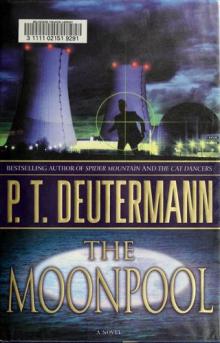 Cam - 03 - The Moonpool
Cam - 03 - The Moonpool Trial by Fire
Trial by Fire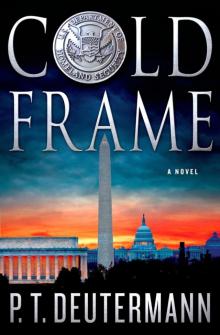 Cold Frame
Cold Frame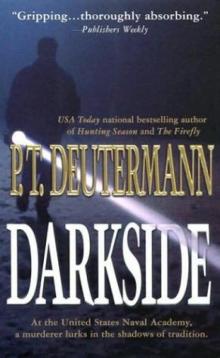 Darkside
Darkside Cam - 04 - Nightwalkers
Cam - 04 - Nightwalkers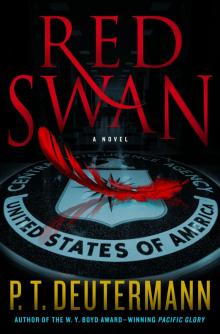 Red Swan
Red Swan The Commodore
The Commodore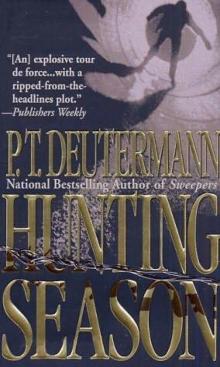 Hunting Season
Hunting Season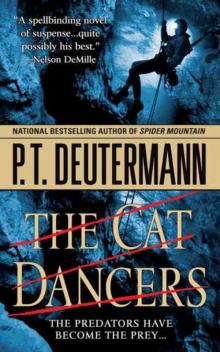 The Cat Dancers
The Cat Dancers Scorpion in the Sea
Scorpion in the Sea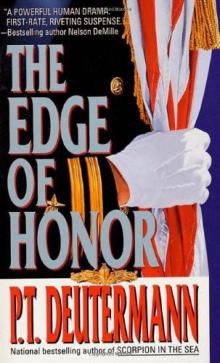 The Edge of Honor
The Edge of Honor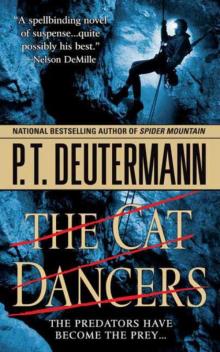 The Cat Dancers cr-1
The Cat Dancers cr-1 The Iceman
The Iceman The Iceman_A Novel
The Iceman_A Novel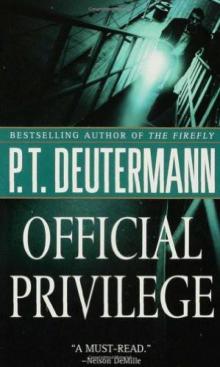 Official Privilege
Official Privilege Sentinels of Fire
Sentinels of Fire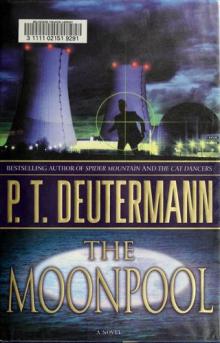 The Moonpool cr-3
The Moonpool cr-3 Nightwalkers cr-4
Nightwalkers cr-4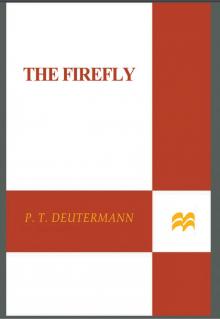 The Firefly
The Firefly Spider mountain cr-2
Spider mountain cr-2 Pacific Glory
Pacific Glory The Last Man
The Last Man